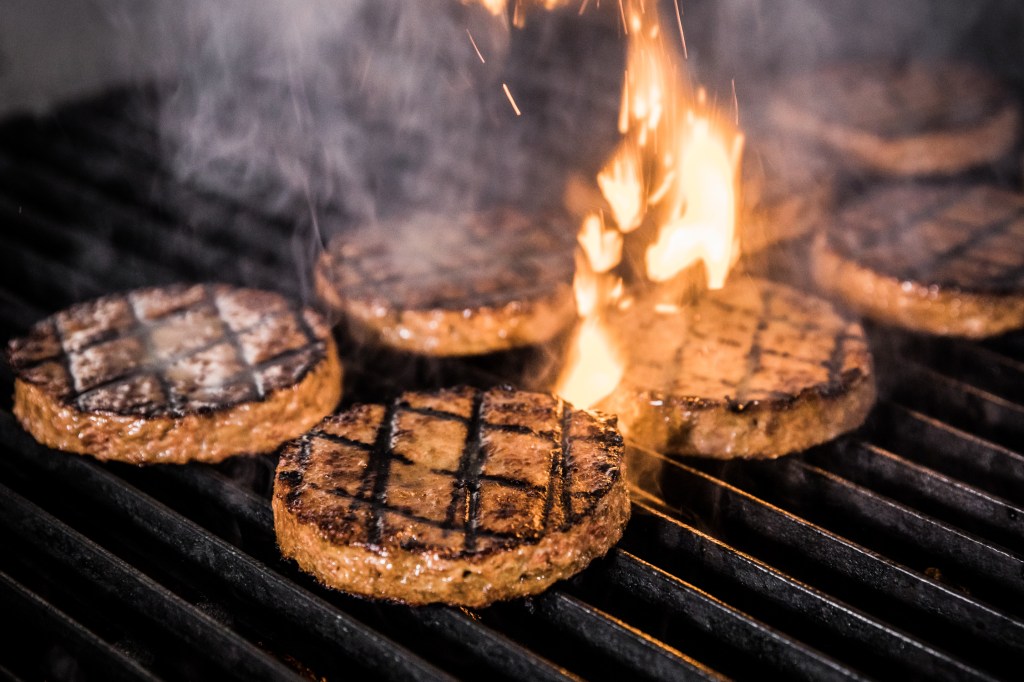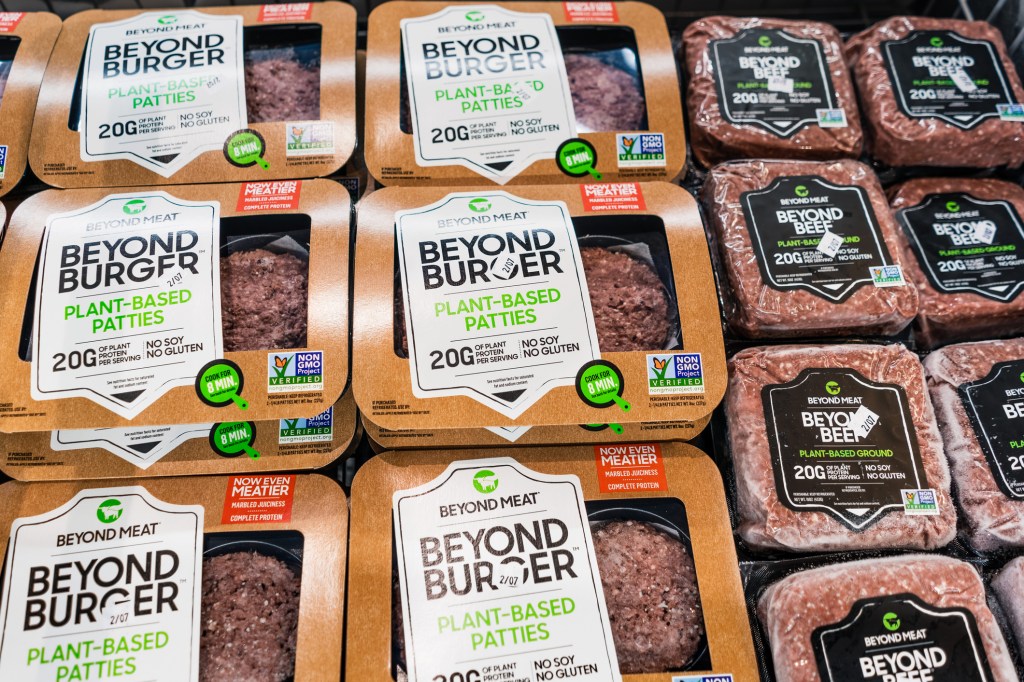Sustainably feeding the world’s growing population is an existential challenge that food manufacturers need to help address now, says Nick Hazell, CEO of v2food.
Speaking at the inaugural Future Alternative roundtable, Hazell said we don’t have the luxury of time when addressing how to satiate the appetite of the growing global middle class. The current system of using vast amounts of land to feed and grow livestock is no longer viable, he insists.
“The current system is, you make lots of feedstock – soy and other legumes – possibly by winning land over from current ecosystems like the Amazon. And then you take that and you feed it to an animal and it will get converted into meat. It’s insanely inefficient. You need 20 times the amount of soy to get a kilo of meat, and we will physically run out of land on this planet within 10 years if we carry on doing what we’re doing,” he said.
v2food was founded in 2019 as a partnership between CSIRO, Main Sequence Ventures and Jack Cowin’s Competitive Foods Australia (the company behind Hungry Jacks). It’s leading the plant-based meat category in Australia, and is now also making in-roads in the Chinese market, with plans for Europe in the not too distant future.
Looks like meat, cooks like meat
v2food’s range of plant-based burger patties, mince and sausages are designed to easily sub in for their traditional protein counterparts, without compromising on flavour.

Mimicking meat as closely as possible is absolutely crucial in convincing consumers to make plant-based alternatives a staple in their diet.
“The thing about meat is that it’s delicious,” Hazell said. “That’s the reason we eat it, and humans are really going to struggle if we ask them to make moral decisions to change their habits … We’re driven by our dopamine rewards. We do all sorts of crazy stuff, which is not really in our own interests, because we like it. So I think v2’s job is to make sure that we create a delicious meat that consumers love – and prefer to meat.”
“You don’t want your protein to taste of soy or pea or fava. It’s got to taste of nothing, because then we can build meat flavour into it.”
Regardless of their environmental or sustainability credentials, if plant-based products don’t taste like the real deal, they’ll never make the impact they’re striving for.
“There are a lot of consumers who say they’ve tasted plant-based meat and they’re not going to taste it again. So that’s a problem. If the product doesn’t deliver, then we destroy the category. So we’ve got to do everything we can to make sure our product tastes absolutely fantastic,” Hazell said.
For plant-based food manufacturers, perfecting taste is a technology challenge, not a culinary one.

“We’re lucky to have the support of the CSIRO, but there are lots of other universities we work with to solve technical problems so we can have an absolutely delicious taste, because it’s not a trivial problem.”
For plant-based meats, one of the most important contributors to taste is the protein source. In v2food’s case, it’s the soy-based Textured Vegetable Protein, and ironically, it needs to be as tasteless as possible.
“Bottom line: you don’t want your protein to taste of soy or pea or fava. It’s got to taste of nothing, because then we can build meat flavour into it.”
Equally important, Hazell said, is ensuring plant-based products are just as easy to cook as the products they’re replacing.
“If you give our product to a chef or a cook, they will be able to do with it what they did before. So if you’re a cook and your go-to is a spag bol on a Wednesday night, you can make a spag bol on a Wednesday night. No difference. You buy the stuff from Coles, you buy a jar of Dolmio or whatever you use, and you make your spag bol.
“So long as our product delivers and can be used as meat, then we don’t have to re-educate 25 million people in Australia, or 10 billion people in the world, because they can use it in the same way. And I think that’s pretty important because lets face it, most of us struggle to cook during the weeks, to decide what we’re going to put on the table. We can’t ask people to re-educate themselves or to [learn] new cooking skills or new recipes because we could be waiting for generations. We’ve got to crack this in years, not in generations.”
Meat is not the enemy
Another way to fast track the roll-out of plant-based products is to follow the old ‘work smarter, not harder’ adage. For v2food, this has meant collaborating with the meat industry.

“We don’t want to have to build a meat factory every time we grow in scale. So we collaborate with meat factories. The reality is, if you look at every single market in the world, there is already a meat industry, and it’s well developed. It looks differently depending on which country you look at, but it’s still a meat supply chain,” Hazell said.
“So, like the Amazons and Dells of the world, why don’t we use existing infrastructure as much as possible? Amazon didn’t invent the internet, nor did it invent the postal service. It basically piggybacked on existing infrastructure. And if you do that, then you can be scalable in a timeframe which is consistent with doing something within the next five to 10 years, because we haven’t got any more time. That’s the sort of timescale we have to get to a global impact. Otherwise, we’re toast.”
“We will physically run out of land on this planet within 10 years if we carry on doing what we’re doing”
Hazell said the current Senate inquiry examining whether plant-based food products should be able to use words like “meat”, “chicken” and “mince” in their marketing is simply a matter of the meat industry feeling threatened.
“The reality is, the world is chronically short on protein. And Australia exports 75-80 percent of its meat. So big picture: this is not going to be the end of the meat industry,” he said.
With Australia’s plant-based sector continuing to gain momentum (it’s projected to be a $3 billion industry by 2030) and the meat industry unlikely to suffer any serious loss of market share any time soon, the focus should be on how, together, they can help to sustainably feed the planet.
“Wouldn’t it be great if our meat industry was sustainable and was the premium meat industry in the world, selling premium meat to people who want to eat animal meat?” Hazell said.
“And at the same time, we create this huge plant-based industry exporting plant-based to the world, because the world is desperate for more meat. And we can turn all of these amazing crops that we grow in Australia into meat. I can do that 20 times more efficiently than if I pass them through a cow. So that means we can restore the land back to the Amazon, because we don’t need all this land to grow soy because we’re 20 times more efficient by using it directly. That goal is really worth putting everything into.”
To stay up-to-date on the latest industry headlines, sign up to Future Alternative’s enewsletter.
Posted on:


